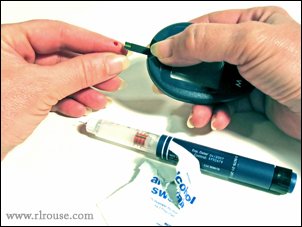 There are many options available in getting free diabetic supplies, but if you are 65 years of age or older the best way to get diabetic supplies for free is through Medicare. Designed to provide health insurance to American citizens aged 65 and over, Medicare covers the treatment of diabetes, including that of diabetic medications and supplies. However, getting Medicare is not as easy as it sounds, as it also has specific requirements for eligibility as well as procedures on how to avail of the supplies provided by the coverage.
There are many options available in getting free diabetic supplies, but if you are 65 years of age or older the best way to get diabetic supplies for free is through Medicare. Designed to provide health insurance to American citizens aged 65 and over, Medicare covers the treatment of diabetes, including that of diabetic medications and supplies. However, getting Medicare is not as easy as it sounds, as it also has specific requirements for eligibility as well as procedures on how to avail of the supplies provided by the coverage.
The following are some important facts you need to know about availing free diabetic supplies through Medicare:
Who Does it Cover?
Aside from being 65 years old and above, Medicare also needs other specific requirements in order to become eligible for free diabetic supplies, such as a history of high blood pressure or hypertension, abnormal levels of cholesterol or triglyceride, obesity or a high blood sugar level. Medicare may also cover those who are overweight or have a family history of diabetes. For women, Medicare might also apply if they have a history of gestational diabetes wherein they have diabetic during pregnancy or have given birth to a baby that weighs more than 9 pounds.
What Does it Cover?
The main diabetic supplies that Medicare covers is that of blood glucose testing equipment, including blood sugar monitors/glucose meters, blood glucose test strips, lancets and blood glucose solutions for checking the accuracy of the meter and the test strips. This applies for diabetics covered by Medicare whether they require insulin doses or not, though the amount of free diabetic supplies that are covered may vary. Beneficiaries that require regular insulin doses, for instance, may be able to avail of 100 test strips and lancets each month and a lancet device every 6 months, while those that do not require insulin can avail of only 100 test strips every 3 months and a lancet device. However, it is possible to get additional test strips and lancets upon recommendation of a physician. Other diabetic supplies that may also be covered by Medicare include external insulin pumps, depth-inlay shoes or custom-made shoes and therapeutic inserts.
In addition, Medicare also covers the cost of diabetes screening, particularly two fasting blood glucose tests per year, as well as for self-management training for people at risk of complications arising from diabetes or have recently been diagnosed with the diabetes in order to teach them how to properly manage their diabetes.
How Do You Get It?
Getting free diabetic supplies is relatively easy, provided of course that you have a prescription from a doctor from it. Medicare will only cover the diabetic supplies that you ask for if they are prescribed by the doctor. The prescription should clearly state that you have diabetes, whether you require insulin or not, the number of times you need to be tested for blood sugar and the amount of test strips and lancets needed per month. If you are requesting for a blood glucose meter, the prescription must also specify what type of glucose meter you need and the reason why you need such a particular meter. For instance, a blood glucose meter that sends out an audio report of test results may be provided for diabetics who also have hearing difficulties.
With the prescription in hand, you can simply pick up your free diabetic supplies from any pharmacy or medical equipment supplier. Keep in mind that when purchasing supplies through a supplier, you must make the order yourself. It is also possible to ask for refills for lancets, strips and other similar supplies as long as it is within the prescribed limit. However, keep in mind that Medicare will not cover any supplies which you did not ask for, supplies that were automatically sent to you by suppliers, or supplies which have been ordered directly by the doctor for you. The pharmacy or supplier that will provide the supplies must also be enrolled in Medicare order for the program to cover the costs.
If you require therapeutic footwear, you must comply with additional special requirements as well. First, your doctor must certify that you have diabetes and have the following conditions in one or both of your feet: foot ulcers, calluses that may lead to foot calluses, poor circulation, deformed foot/feet or partial/complete amputation of the foot. Your doctor should also certify that you are under a comprehensive diabetes care plan and that the footwear will be provided and fitted by a qualified individual.
Jacob Vitalia is a retired communications expert for a public relations firm in South Carolina. Diagnosed with Type 1 diabetes since his early teens, Jacob has passionately written countless articles and ebooks regarding his experiences living with diabetes. For more information on diabetes and testing supplies, visit www.diabetictestingsuppliesinfo.com.